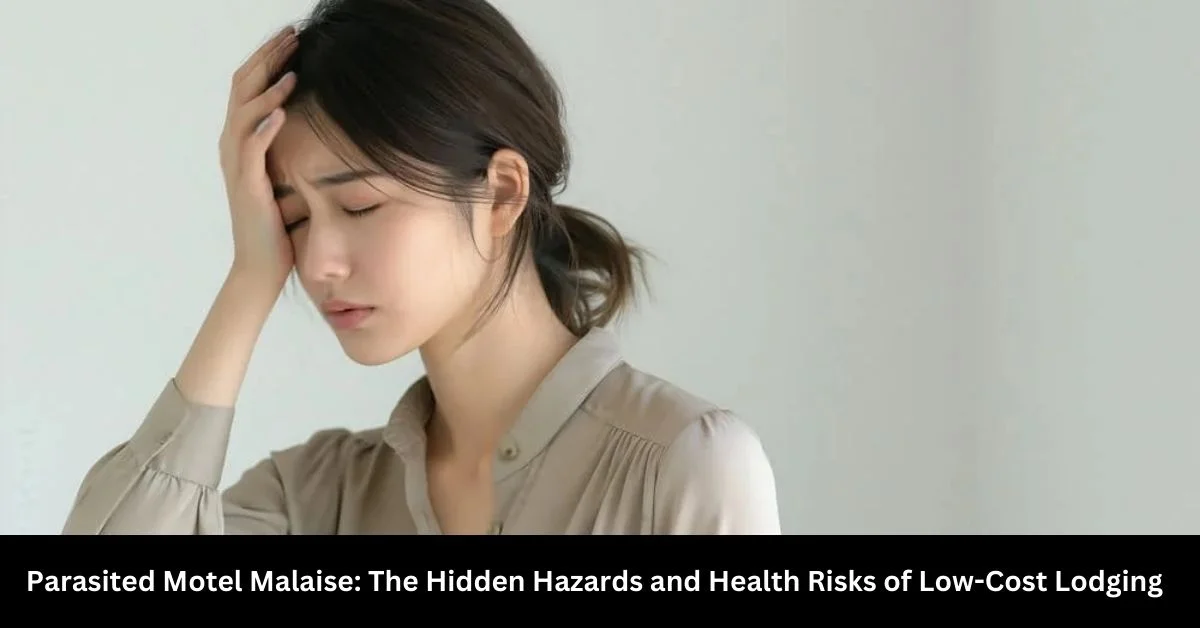Introduction
Budget motels can be a convenient choice for many travellers, offering an affordable option for brief stays. However, this affordability sometimes comes with hidden hazards, often impacting a guest’s health and well-being. “Parasites motel malaise” refers to the collection of health risks and discomforts associated with unclean or poorly maintained motels, including infestations, mould, and neglected facilities. This article delves into the meaning of parasited motel malaise, the health risks it encompasses, the economic factors behind these conditions, and the preventive steps travellers can take to protect themselves.
Understanding Parasited Motel Malaise
Parasited motel malaise isn’t just about discomfort; it encompasses a range of issues that can directly or indirectly harm guests’ health. In motels where cleanliness is compromised, problems like bed bugs, mites, poor air quality, and unhygienic bathrooms are common. The term “parasited” highlights the infestation aspect, while “malaise” reflects the unease and discomfort experienced by guests in these substandard environments. While low prices may be attractive, the reality is that neglecting maintenance and sanitation can lead to health issues that outweigh the savings.
Health Risks Associated with Parasites Motel Malaise
1. Bed Bugs, Fleas, and Other Parasites
Infestations of bed bugs and fleas are among the most common problems in poorly managed motels. Bed bugs, tiny insects that feed on human blood, are difficult to eradicate once they infest a space. Bed bug bites can lead to itchy welts, allergic reactions, and in severe cases, psychological distress due to sleeplessness and anxiety. Fleas, typically associated with pets, can also infect rooms and spread diseases like typhus and even plague, though rare.
- Spotting Infestations: Bed bugs often hide in mattress seams, headboards, and even behind wallpaper. Fleas might be harder to detect but can be indicated by sudden itching or the presence of small black or red dots on bedding.
2. Mould and Mildew
Mould and mildew are prevalent in motels where ventilation is poor and maintenance is lacking. These fungi thrive in damp environments and can significantly impact air quality. Prolonged exposure to mould can trigger respiratory problems, particularly in people with asthma or mould allergies. Mildew is often less harmful but can still cause allergic reactions and leave an unpleasant odour.
- Signs of Mould Issues: A musty smell, visible dark spots on walls, and condensation on windows are clear indicators of a mould problem. Mould often grows in areas with poor ventilation, such as bathrooms and basements.
3. Unclean Bedding, Linens, and Towels
Guests expect fresh, sanitised bedding and towels; however, some low-cost motels may skip thorough cleaning to save time and expenses. This oversight can result in the spread of bacteria, viruses, and fungi that cause skin infections, rashes, and in some cases, respiratory infections.
- Potential Infections: Besides common skin conditions, unclean linens can harbour MRSA (Methicillin-resistant Staphylococcus aureus) bacteria, which can lead to serious infections if it enters the body through a cut or scrape.
4. Bathroom and Plumbing Issues
Neglected bathrooms often feature mouldy tiles, unsanitized toilets, and blocked drains, which can quickly become breeding grounds for bacteria and viruses. E. coli and other harmful bacteria thrive in areas that aren’t regularly disinfected, posing a risk of gastrointestinal illnesses to guests.
- Common Hazards in Shared Bathrooms: Shared bathrooms in budget motels can harbour pathogens if cleaning is infrequent. Showers, sinks, and toilets that aren’t properly sanitised are major sources of contamination.
Economic Drivers of Poor Hygiene Standards in Budget Motels
The root of parasited motel malaise often lies in the economic model of budget motels. Limited resources and high guest turnover can strain motel management’s ability to uphold basic cleanliness standards. Here are some reasons these conditions persist:
- Cost-Cutting on Maintenance and Staffing: Inexpensive motels operate on slim margins, often cutting costs by reducing maintenance and cleaning staff. This results in less frequent room cleaning and delayed responses to repair issues.
- High Volume, Short Stays: Budget motels cater to travellers seeking quick stays, creating a high turnover rate. Rooms need to be cleaned rapidly, leaving little time for deep cleaning or pest control.
- Limited Investment in Facilities: Many budget motels operate as independently-owned businesses or franchises without substantial investment in property upkeep. As a result, some rooms remain in substandard conditions, with ageing furniture and poor structural integrity.
- Lack of Oversight and Regulation: Regulatory oversight in motels is less stringent than in hotels, which often leads to more relaxed enforcement of sanitation standards. This is especially true in independently-owned motels that may not follow corporate cleanliness guidelines.
Recognizing the Warning Signs of Parasited Motel Malaise
Awareness of the potential hazards in budget motels allows travellers to avoid or minimise exposure to parasites motel malaise. Here are some critical signs to watch for:
- Persistent Odours: Musty or damp odours can indicate mould or mildew, which signals that proper cleaning and ventilation are lacking.
- Questionable Reviews: Online reviews often mention specific cleanliness issues. Consistent complaints about bugs, odours, or unclean conditions are red flags.
- Dirty or Worn-Out Furnishings: Signs of wear, such as stained carpets or faded curtains, can hint at neglected maintenance.
- Neglected Bathroom Fixtures: A dirty bathroom, especially one with visible mold or poorly maintained fixtures, points to sanitation problems.
- Inadequate Amenities: Missing basics like soap, fresh towels, or clean sheets may indicate a lack of commitment to guest well-being.
How to Protect Yourself: Essential Tips for a Safe Stay
Even in budget accommodations, there are steps you can take to reduce exposure to health hazards and enjoy a more comfortable stay.
Research Ahead of Time
Use reliable review sites like TripAdvisor, Google Reviews, and Yelp to read about others’ experiences. Specific complaints about cleanliness and pest issues should be taken seriously.
Perform a Room Inspection
Upon arrival, check the room thoroughly for signs of bed bugs, mould, or mildew. Pull back the sheets to inspect the mattress seams, look for spots on walls, and check that towels and bedding appear freshly laundered.
Bring Travel Sanitizers
Carry travel-size disinfectant sprays, hand sanitizers, and even disposable bed sheets if possible. These items can help you sanitise surfaces and bedding, adding a layer of protection.
Limit Contact with Shared Surfaces
Consider using disposable gloves or tissues when handling items like light switches, remote controls, and doorknobs. These high-touch areas can harbour bacteria and are often overlooked during cleaning.
Voice Your Concerns to Management
If you notice issues, report them immediately to motel management. Reputable establishments should prioritise guest concerns and address the issues promptly. If they don’t, consider finding alternative accommodations.
Bring Personal Bedding if Possible
Bringing a sleep sack or travel sheet can give you peace of mind, especially if you’re concerned about the cleanliness of provided linens. Many lightweight, washable sleep sacks are available for this purpose.
Also Read: Boost Efficiency with Immediate X5 Intal Technology
Choosing Budget Lodging Wisely: Setting Realistic Expectations
While not all budget motels are unhygienic, managing expectations and exercising caution is wise. By understanding that some budget accommodations may lack the resources for rigorous cleanliness, travellers can make more informed choices. Sites like Hotels.com, Booking.com, and Airbnb allow for filtering based on cleanliness ratings, helping you find budget-friendly options without compromising safety.
Conclusion
Parasited motel malaise is a real and often overlooked risk associated with budget lodging. However, with proper knowledge and precaution, travellers can avoid these hazards and enjoy a safe and affordable stay. Identifying warning signs and taking preventative measures allows you to balance affordability and safety, making your travel experience both economical and secure.






